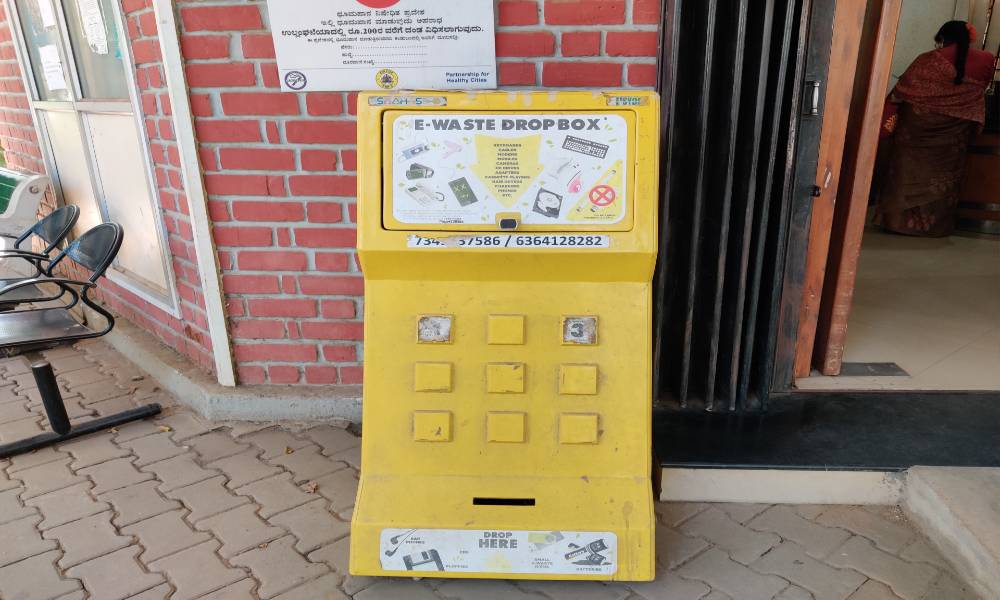The COVID-19 pandemic and the subsequent work-from-homes have pushed the electronic waste industry into limbo.
Bengaluru: Salim Pasha, one of the directors at the Eco E-waste Recyclers, ran his business successfully for the past 11 years from Nayandahalli, Bengaluru, with relative calm until the pandemic hit. From trading in 10-15 tonnes of e-waste every month, his business came to an abrupt halt as the IT city went into lockdown.
The company that roughly employed 5000 people has now shut. “I tried to pay them (my workers) half their salaries for five months, but ultimately had to let them go as no work was coming my way,” says Pasha.
Till the time the IT industry is back, his business will not be, he feels.
E-waste or electronic waste are discarded electronic products that can be harmful to our environment. As the pandemic has pushed businesses virtual, e-waste collection and processing have taken a dip in the city of Bengaluru.
The Deserted Collection Bins
Next to the entry gate of the Bengaluru One Centre, the yellow coloured e-waste collection bin stands empty. The helpline numbers on it are torn and layers of dust are gathering on its sides.
Indira, the billing operator at the centre running in Jayanagar, 5th Block, explains that the disposal rate of e-waste in their centre has dropped significantly. Pre-COVID-19, they used to receive about 40-50 kgs of e-waste every month and now, their unit only gets 10-15 kgs of e-waste a month.

The security guard at another Bengaluru One Centre just a block away, says that the bin that used to get filled within a week earlier now takes well over a month to fill.
Ankita Kunwar, the Project Coordinator at SAAHAS, the NGO that co-runs the Be-Responsible collective under which the e-waste bins are placed in Bengaluru One Centres, post offices, and apartment complexes in the city, gives two reasons for this drop.
“First, due to COVID-19, people are hesitant to touch the collection box and second, since most of the people in Bengaluru are migrants, they have all left for their hometowns, thus resulting in the drop of collection,” she says.
Despite being in the business for 21 years, the operations at SAAHAS have also taken a hit. The pandemic has taken a financial toll on their investors who have now backed out of the Be-responsible project.
“In the absence of that project, we are looking at other entrepreneurial initiatives to meet the demand but the transition period is very hard,” Ankita says.
A problem bigger than the pandemic

More than 90 per cent of the e-waste is treated by the informal sector said Venkatesha Murthy, the Vice Chairman at the Sustainable Electronics Recycling International (SERI) board. “Only seven to eight per cent of all the e-waste comes into the formal sector. Most of the e-waste, like bulbs or lamps, goes in public dustbins. The mercury from this waste contaminates the soil, groundwater, and environment.”
Murthy is also the founder and C.E.O. of Vans Chemistry, and his company has seen a downfall in revenue of over 20 per cent after the pandemic.
The Institute of Social and Economic Change conducted a study in 2015 on the “E-Waste Management in Urban Cities: A Situation Analysis of Bangalore”. S Manasi who conducted the study found that most people who are engaged in the informal sector of disposing of e-waste are completely unaware of the health and environmental damage they are causing to themselves and others around them.
“They (people engaged in the informal sector) have a lot of respiratory and skin issues but they are not aware. They sit on the road and process the wastes with their bare hands yet they are unable to link that their problems are connected to the work they do,” she says.
Most informal sector workers that Manasi spoke to were dealing in practices which she believes to be detrimental to the environment. “To get gold out of the computers they have to use cyanide and when they are done they put these chemicals into the gutter. Similarly, to extract copper from the wires, instead of laboriously peeling it off, they rent some lands outside the city, and burn the plastic off,” she explains.
‘Get the most blame, the least help’
The street across the main church at Gowri Palya is strewn with e-waste scrap dealers who work practically on the road. The COVID-19 pandemic and the subsequent work-from-home of the I.T. industry have also hit them hard.
Anand Raj, the owner of Maria Electronics, has dealt with old televisions for as long as he can remember. The pandemic has reduced his earning capacity by almost 85 per cent. “Earlier, I used to get at least two to three television sets a day, now it is good if I get even one or two in a week.”
A few steps away, Parveez, another shop owner complained of the lack of e-waste coming in. “There has been a 50 per cent decrease in our work capacity. Earlier, we got at least 20 items of scrap a month, now it is not even 10.”
Parveez’s business, and of others around him too, depended heavily on the e-waste supplied by the IT industry of Bengaluru. These companies used to call them and sell them their discarded waste by the kilo.

Out of the 10-15 businesses here on this very road, says Parveez, three to four have already shut shop due to the falling incomes.
Sharif, another shop owner, complained that most of the blame for the city’s pollution ultimately falls on the informal sector, and yet we don’t get any assistance from the government. “To get into the formal sector, you need resources, have to buy a proper piece of land, have to register with the GST, how can someone do this in the little that we earn?” he asked.





Covered a different issue very well.
Beautifully written, great work on the infographic!
This is one of the most beautifully written stories, hands down!
Love the infographic. Great story.
A really well written piece. Great work.
Loved the infographic